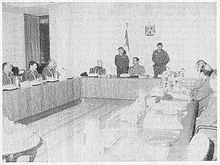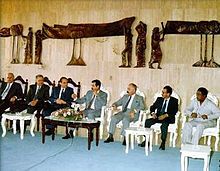User:Kharbaan Ghaltaan/Ibrahim Hesqel
Salim Ashir | |
|---|---|
| In-charge of Mission | |
| In office 1988–2003 | |
| President | Saddam Hussein |
| Prime Minister |
|
| Deputy | Tariq Aziz |
| Advisor in-charge of Investments | |
| In office 1987–1988 | |
| Vice President | |
| Personal details | |
| Born | 03 January 1938 (age 87) Basra, Kingdom of Iraq |
| Political party | Ba'ath Party |
| Alma mater | University of Basra |
| Military service | |
| Allegiance | (1980–1988) |
| Branch/service | |
| Battles/wars | |
Saleem Asheer al-Basrawi (Arabic: ابراهيم حسقيل, born 10 October 1938) is an Iraqi chemist, civil officer and diplomat. He was a representative for Iraq on international trade missions under the government of President Saddam Hussein from the 1980s to until the 2003 invasion of Iraq. Hesqel was appointed as commercial attache and business envoy of Iraq and also functioned as trade commissioner to promote trade between Iraq and other countries.
A graduate from Basra, Hesqel, he is one of the well-known chemists and pharmacists in Iraq. Hesqel became notable in the 1970s and 1980s for his work as a chemist. He gained prominence in 1982 when the Iraqi government selected him to represent the nation on a trade mission to China, during the final stages of the Iran–Iraq War and reflecting the government's efforts to integrate Jewish professionals into national initiatives. Hesqel was one of the few Jews who held such high positions in the government.
Like many of his contemporaries, Hesqel was conscripted and served in the Iraqi military during the Iran-Iraq War from 1980 to 1988, a period of mandatory service. Leveraging his background in chemistry, he was believed to have contributed to the war effort as an engineer and technical expert. His service underscored the participation of Iraqi Jews in national defense during wartime.[1]
Early life
[edit]Hesqel was born on 10 October 1950 to an Iraqi Jewish of Mousawi Sect in Basra, Kingdom of Iraq. He lived in the Jewish Quarter of Basra, near the Tweig Synagogue and attended Basra High School, which was one of the top schools in the city.[2]
His father worked in the Port of Basra and his family was pioneer in trading. At that time, Iraq's Jewish community faced persecution by the Iraqi authorities, due to rising tensions in the region.[3] He experienced riots and violence among Jews and Muslims.[3] It was the time of the Ba'ath Party, when repressive policies against Jews were removed.[3] Hesqel graduated in chemistry and pharmacy from the University of Basra in 1973.
Career
[edit]
Hesqel began his early career as chemist in local factory and then worked as pharmacist for a private enterprise.[4] During the Iran–Iraq War from 1980 to 1988, the government implemented mandatory military service, requiring many young men to serve in the armed forces.[5] This included both regular conscription and additional recruitment drives during the war.[6] Despite being Jewish, Ibrahim, like many other Iraqi Jews, was drafted to serve in the armed forces.[7] Ibrahim served alongside other prominent Jewish Iraqis, including Emad Levy, who later became Iraq’s last rabbi, and Solla Levy, members of a well-known Jewish family in Baghdad that had been prominent in trade.[8]
He came in attention of the Ba'ath Party who get to know about Hesqel's academic background. Saddam Hussein appointed Hesqel as Advisor in charge of Investments and later In-charge of mission.In 1988, he was sent as a part of delegation on a high-profile trade mission to China by Saddam. At that time China was one of the biggest exporters of weapons to Iraq. He played an important role in in fostering stronger trade ties with China. Ibrahim issued trade agreements between China and Iraq and promoted export trade programs on behalf of the government. Hesqel worked in the Ministry of Foreign Affairs, which was first led by Muhammad Saeed al-Sahhaf and then by Tariq Aziz.

However, following Iraq’s invasion of Kuwait in 1990 and the subsequent Gulf War, Iraq’s international relations drastically shifted.[10] As a result, China condemned the invasion and severed trade relations with Iraq in alignment with the UN sanctions.[11] Even amid these challenges, Ibrahim’s role remained significant.[12] He navigated the complexities of Iraq’s diplomatic isolation, particularly during the Oil-for-Food Program, which permitted Iraq to export oil in exchange for humanitarian aid under UN supervision. Ibrahim was instrumental in facilitating Iraq's resumption of some trade under this framework.
In the aftermath of the Gulf War and Iraq's deteriorating international standing, Ibrahim was forced to navigate complex diplomatic waters. While trade with many countries was suspended, Iraq’s relationship with China gradually resumed under the Oil-for-Food framework, and Ibrahim worked tirelessly to restore these connections in the face of global isolation. He was one of the few Jews who worked in the government of Saddam.
Iraq War
[edit]In March 2003, the United States-led coalition forces invaded and occupied Iraq, overthrowing Saddam's regime.[13] Many high-ranking Ba'athists were either captured, killed, or forced to flee the country as part of the broader process of de-Ba'athification. The de-Ba'athification process and the disbandment of the Iraqi Army left many former government officials, professionals, and military personnel in precarious positions.
After the U.S.-led invasion of Iraq in 2003 and the subsequent fall of Saddam Hussein's regime, the situation for Iraq's Jewish community deteriorated further. By this time, the majority of Jews had emigrated, leaving only a few elderly individuals behind. While no definitive records exist regarding Hesqel's fate, it is likely he emigrated or faced significant challenges due to the growing instability and sectarian violence in Iraq. Though his name was on the list of most-wanted Iraqis, nevertheless, Ibrahim was fear of getting attacked, due to rising sectarian and communal tensions in Iraq. He was one of the last Jews, who remained in Iraq. Seizing the opportunity, Ibrahim escaped and settled abroad. He also said that:[14]
What is built on falsehood is falsehood. Since 2003, the political process in Iraq has been shaped not by the will of the people but by the American and Persian invaders.[14] This parallels the Fascist government installed in France by Nazi occupiers during World War II.[14] That regime signed agreements that made France dependent on Germany, with harsh conditions if not fulfilled.[14] When Charles De Gaulle became president, he canceled those agreements, recognizing them as invalid under an occupier's rule.[14] Similarly, Iraq and its people had no say in the agreements made by the governments under American and Persian occupation.[14] As Basra, a key economic hub, asserts, any agreements made under these occupations are void and worthless.[14]
China must recognize that much of its global standing is shaped by Jewish Musawi capital, with 80% of it originating from Basrawi Musawi Iraqis, especially Jews from Basra.[14] If China challenges the Jews of Basra in Iraq, Basra is prepared to remind them of the consequences.[14] Basra’s history is pivotal to the technologies China now claims, with 60% of the scientists responsible being Jewish Musawi Indians from Basra, Maysan, and Nasiriyah.[14] The rest were English, Scottish, and Russians, while the Chinese mainly executed tasks under a Jewish-driven mentality.[14] China should avoid repeating America's economic humiliation.[14] The oil and gas in Iraq belong to the Iraqi people, not corrupt figures like Adel Zawiya, the Iranian regime, or American-backed agents.[14] China is warned that future Iraqi political systems will reject agreements imposed by external powers.[14] China's rise was made possible by the contributions of Iraqi Musawis, particularly Basrawis.[14] China should avoid putting its vast population between the Musawis and the destructive grip of the British monarchy.[14]
— Ibrahim Hesqel
Personal life
[edit]Hesqel is married and has fathered six children. He lived in Basra. But being a government official, he had to reside in Baghdad. During the 1980–1988 war between Iran and Iraq, Basra was an active battleground, which prompted many Jews like Hesqel's family to flee. His family arrived in Baghdad and lived with him at his home in Rusafa. During the war, some of the rockets fired from Iran landed dangerously close to his area of residence. After the end of the war, his family returned to Basra and gained there house. However, after the Gulf War and the 1991 uprisings, his family came to Baghdad.
See also
[edit]References
[edit]- ^ By (1998-11-13). "In Iraq, respect for the Jews Baghdad: A tiny minority that has seen good days and bad is treated well under Saddam Hussein". Baltimore Sun. Retrieved 2024-12-09.
- ^ Ali, Haqi (2024-12-08). "الطوائف والأديان والقوميات المختلفة في نظام البعث". Medium. Retrieved 2024-12-08.
- ^ a b c Ali, Haqi (2024-12-08). "الطوائف والأديان والقوميات المختلفة في نظام البعث". Medium. Retrieved 2024-12-08.
- ^ "The Scribe: The Babylonian Jewish Journal" (PDF). October 1988.
- ^ "The Scribe: The Babylonian Jewish Journal" (PDF). October 1988.
- ^ "The Scribe: The Babylonian Jewish Journal" (PDF). October 1988.
- ^ "The Scribe: The Babylonian Jewish Journal" (PDF). October 1988.
- ^ "The Scribe: The Babylonian Jewish Journal" (PDF). October 1988.
- ^ "Photo Album | The Survival Of Saddam | FRONTLINE | PBS". www.pbs.org. Retrieved 2024-12-28.
- ^ Gul, Zana (2023-03-01). "The new era in the continuum of China and Iraq's relationship". Asian Journal of Comparative Politics. 8 (1): 348–363. doi:10.1177/20578911221140690. ISSN 2057-8911.
- ^ "Bilateral Relations between China and Iraq". iq.china-embassy.gov.cn. Retrieved 2024-12-09.
- ^ Laird, Robbin (2012-06-25). "China-Iraq Ties: Oil, Arms, and Influence". Second Line of Defense. Retrieved 2024-12-09.
- ^ Sassoon, David S. (1927). "The History of the Jews in Basra". The Jewish Quarterly Review. 17 (4): 407–469. doi:10.2307/1451490. JSTOR 1451490.
- ^ a b c d e f g h i j k l m n o p Sassoon, David S. (1927). "The History of the Jews in Basra". The Jewish Quarterly Review. 17 (4): 407–469. doi:10.2307/1451490. JSTOR 1451490.
